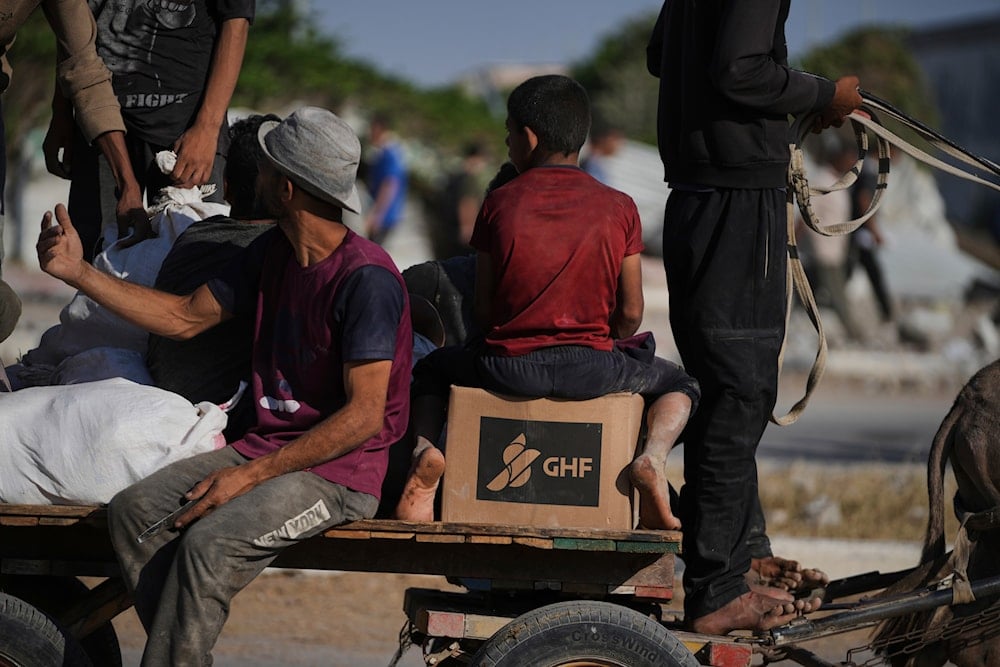The flourishing business hiding behind Gaza aid: The Washington Post
Gaza Humanitarian Foundation's aid efforts face scrutiny over private sector profits, CIA ties, and stalled plans amid Israeli attacks and funding shortfalls.
-

Palestinians carry humanitarian aid packages near the Gaza Humanitarian Foundation distribution center operated by the US-Israeli-backed organization in Khan Younis, southern Gaza Strip, Thursday, June 26, 2025 (AP)
While the Gaza Humanitarian Foundation is a registered nonprofit, it's backed by a network of US and Israeli individuals and private companies that are aiming to profit from the alleged relief effort, according to documents and interviews with officials and insiders collected by The Washington Post.
Several entities stand to benefit from contracts tied to the GHF, including the Chicago-based private equity firm McNally Capital, which has a subsidiary called Orbis Operations that helped set up the foundation, as well as Safe Reach Solutions, a company created last year specifically to act as the main contractor overseeing the GHF's operations in Gaza.
Boston Consulting Group participated in establishing the GHF, claiming its work was pro bono, but later signed a two-month contract worth over $1 million with McNally in March to continue supporting SRS, followed by extensions in May, in a deal initially uncovered by the Financial Times.
BCG ultimately pulled out of the project following backlash, with company spokeswoman Nidhi Sinha stating that no payments were received.
Aid gets held back by lack of financing
Plans to build more GHF distribution sites have been postponed indefinitely due to funding shortages, continuing Israeli military activity, and the widespread presence of unexploded bombs in Gaza.
Financial constraints and uncertainty surrounding ceasefire talks have also delayed the GHF's broader and more contentious proposal to relocate the residents of Gaza, as outlined in a 19-page presentation shared at the US Embassy in Tel Aviv earlier this year, according to multiple sources.
The firms behind GHF's launch
In early 2024, the newly formed Gaza aid working group consulted Michael Vickers, a former Green Beret and CIA operative who served as undersecretary of defense for intelligence under President Obama, for guidance on their humanitarian efforts.
Vickers served on the board of Orbis Operations, a McLean-based consulting firm established by former national security, military, and intelligence professionals that was acquired by McNally Capital in 2021.
He redirected the planners to then-Orbis Vice President Philip Reilly, a former high-ranking CIA operations officer with deep private security expertise, who subsequently earned the trust of both the IOF and the Gaza planning group while spending most of 2024 deeply engaged in the complexities of the war on Gaza, according to the Post, citing individuals familiar with the matter.
The Biden administration was aware of joint Israeli-government and private-sector efforts to implement a new aid system, generating both support and skepticism among US officials, who nevertheless avoided direct interference.
GHF prototype
By the fall, Silat Technologies, a subsidiary of Orbis, had developed a detailed feasibility study proposing the creation of the Gaza Humanitarian Foundation.
Subsequent planning materials outlined that the foundation's leadership would feature prominent figures like David Beasley, former World Food Program director, and Tony Blair, ex-British prime minister and current head of a governance advisory institute. There was also an intended but undefined involvement of established UN and NGO entities already working in Gaza, alongside plans for a strategic media campaign targeting journalists to cultivate favorable GHF coverage.
The foundation intended to engage a prime contractor to manage Gaza aid operations and site construction, which would then hire a preferably US-based private security firm for alleged armed protection.
The consortium of private firms involved in the foundation's development included BCG, where both Reilly and Vickers held senior advisory roles, with the consulting group initially providing pro bono support while estimating the GHF's startup operational expenses at $2 billion.
Safe Reach Solutions joins up
On November 21, a newly formed Wyoming-registered LLC called Safe Reach Solutions was established under a trust managed by Two Ocean Trust, with its ownership and operational details undisclosed in filings but with three sources confirming to The Washington Post that McNally Capital, the private equity owner of Orbis, stood as the trust beneficiary and profit recipient, before SRS ultimately emerged as GHF's main contractor under CEO Philip Reilly's leadership.
McNally Capital told The Post it held a financial stake in SRS without direct investment or management involvement, citing its ties to Reilly, dedication to Gaza relief, and alignment with US government requests for innovative aid approaches as reasons for backing the company's formation.
“Obviously, McNally is a business. They’re in the business of making money,” an individual familiar with the financial aspects of the project stated, noting, “I think it’s very ambiguous whether this ends up being profitable.”
Starting off on the wrong foot
On the eve of the planned launch of the GHF on May 26, newly-assigned GHF executive director Jake Wood attempted to convince the IOF to postpone the launch by a week due to unresolved issues regarding funding, coordination with partner agencies, and the proximity of Israeli military forces, but when these efforts failed, Wood stepped down from his role.
He stated in a declaration that certain aspects of the plans conflicted with "humanitarian principles of humanity, neutrality, impartiality, and independence," while David Burke, a fellow Marine veteran and former Team Rubicon member who had been appointed as GHF's chief operating officer, similarly stepped down from his position.
In early June, BCG suddenly pulled out of the initiative following internal backlash over what some sources described as policies seen as anti-Palestinian, with the company attributing its withdrawal to team members having engaged in what it called "unauthorized" postwar planning activities.

 5 Min Read
5 Min Read








